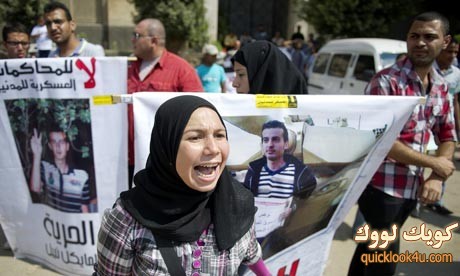Egypt pardons jailed blogger as generals brace for anniversary protests

Maikel Nabil Sanad among almost 2,000 prisoners convicted by military tribunals over the past year who are set to be released

Supporters stand with banners bearing an image of Maikel Nabil Sanad. Photograph: Christian Science Monitor/Getty
An Egyptian blogger jailed by the military junta for insulting the army has been officially pardoned, as the country’s ruling generals attempt to bolster public support before protests planned for the Wednesday’s anniversary of the uprising.
Maikel Nabil Sanad, a 26-year-old Coptic Christian who became a cause celebre for activists opposed to the post-Mubarak military government, was among almost 2,000 prisoners convicted by military tribunals over the past year who are set to be released after an announcement by Egypt’s de facto leader, Field Marshal Mohamed Hussein Tantawi.
Sanad was imprisoned in March over a blogpost titled “The army and the people were never one hand”, inverting a popular Egyptian chant in support of the military.
He refused to acknowledge the legitimacy of the army court that convicted him and staged a high-profile hunger strike behind bars that saw him come close to death several times. He resisted efforts by the authorities to certify him insane and have him transferred to a secure psychiatric unit, and was designated a prisoner of conscience by Amnesty International.
Critics claim that the Supreme Council of the Armed Forces (Scaf), which took power after the toppling of Mubarak in February last year, has proved even more repressive than the regime it replaced. A series of violent crackdowns by the state’s security forces against dissent and public protest has left dozens dead and thousands injured, and up to 12,000 civilians are believed to have been processed through military tribunals in the past 12 months – more than during the whole of Mubarak’s 30-year dictatorship.
Sanad’s pardon follows months of campaigning by No to Military Trials, an activist group that has mobilised many Egyptians against army rule and helped turn the tide of public opinion. Last month Alaa Abd El Fattah, a prominent revolutionary figurehead, was released from prison after being falsely accused of inciting violence against the armed forces, and Scaf has promised more than once to stop putting civilians before military courts.
“We will never forget: the army and people were never one hand,” Sanad’s brother Mark Nabil said on Twitter as news of the pardon came through. “Freeing Maikel is not enough though. The army must, before the revolution’s anniversary [on 25 January], free all those who were convicted by military courts.”
Aalam Wassef, a film maker and campaigner who has followed Sanad’s case closely, said events in Egypt over the past year vindicated the anti-junta post that landed the blogger in jail. “Maikel’s predictions were logical rather than prophetic,” he told the Guardian. “He had maintained a critical stance towards the Egyptian military even before the revolution, so once the generals took power it was very obvious to him the way things would develop.”
Wassef accused Scaf of offering empty gestures in place of genuine reform. “It’s a political concession, though a very provocative one,” he said. “How dare they call it a pardon for Maikel when it is they, the generals, who should be requesting a pardon from the people?”
The first anniversary of Egypt’s revolution is expected to spark some of the largest demonstrations yet seen against the ruling generals. Under sustained pressure from activists, Scaf has sped up its programme of transition to civilian rule and promised a new constitution and presidential elections by the summer, though opponents claim the military cannot be trusted to keep its promises and warn that a facade of democracy is being constructed to mask the entrenchment of the existing political elite.
In the past few days a series of additional measures have been announced by the government to try to dampen the energy of the protest movement, including plans for a series of state-sponsored celebrations on the anniversary day. A cabinet member, Fayza Abul-Naga, has given assurances that no soldiers or riot police will be deployed around Tahrir Square that day.
On Monday Egypt’s newly elected parliament is set to open to much fanfare. The ruling generals hope it will be viewed as a demonstration of their commitment to civilian-led democracy and dissuade the wider population from joining anti-Scaf rallies two days later. According to official results announced at the weekend, the Muslim Brotherhood’s Freedom and Justice party will form the largest parliamentary bloc with about 47% of the representatives. The ultra-conservative Salafist al-Nour party came a strong second, with liberal, leftist and centrist parties gaining a smattering of seats.
Wassef said a large number of protesters would turn out on Wednesday. “There will be a big turnout by revolutionaries, despite a huge effort by Scaf to drown out the noise with celebratory activities,” he said. “I don’t think anyone in their right minds wants to celebrate the deaths and incarcerations we have seen under Scaf rule over the past year.”
Guariad




hi!!!
بالنسبة لتبادل المعلومات معنا على http://www.quicklook4u.com.